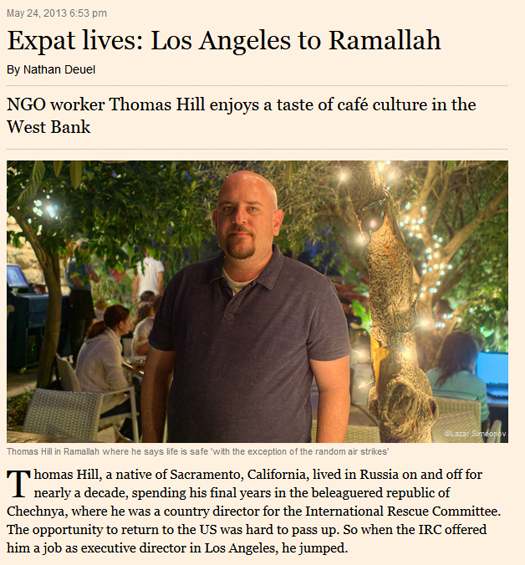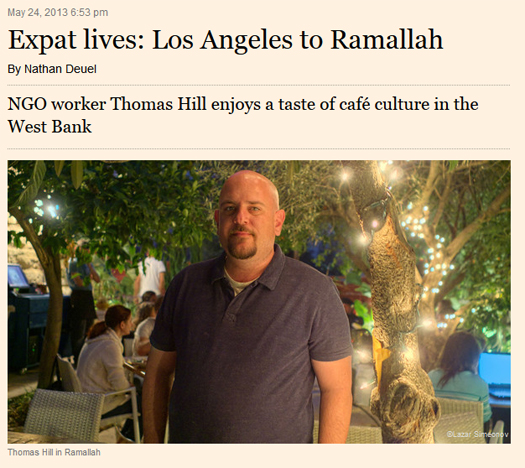CAMERA’s Israel office prompts corrections in the June 15 edition of the Financial Times regarding a feature article which had wrongly reported that there are curfews in eastern Jerusalem and air strikes in Ramallah. The article, “Expat lives: Los Angeles to Ramallah,” by Nathan Deuel, was about Californian Thomas Hill, who moved to Ramallah last year to work for an NGO called Save the Children.
In a post on CAMERA’s Web site last month (“Financial Times Fantasy Air Strikes in Ramallah“), we flagged a photo caption (below) which falsely stated that there are air strikes in Ramallah.

In addition, we noted that the falsehood about air strikes in Ramallah was repeated in the text itself, which quotes Thomas Hill as saying about his life in that city: “Things here are inconvenient, but it’s safe — with the exception of the random air strike.”
CAMERA also contacted Times editors about a second factual error which required correction. The article falsely claimed that there are curfews in eastern Jerusalem, stating: “But as beautiful and romantic as East Jerusalem’s ancient streets and sights are, Hill says the checkpoints, curfews and movement restrictions make it an awkward place to live.”
But as we noted at the time:
There were curfews in eastern Jerusalem last spring? The last record of any curfew in Jerusalem that we can locate dates back to 1988, nearly a quarter of a century before Hill and his wife “explored East Jerusalem.” Before, that, when Jordan controlled eastern Jerusalem, King Hussein imposed curfews in the 1960s, as the New York Times reported April 22, 2013 from its archives from 50 years earlier (“1963 King Ends Parliament in Jordan“). But Hill’s reference to present day curfews in eastern Jerusalem is completely unfounded.
The Financial Times commendable June 15 correction follows:

The erroneous photo caption referring to Ramallah air strikes has been removed (see below for screen shot of the online article as it now appears), as has as the reference to non-existent curfews in eastern Jerusalem.

Hill’s quote regarding random air strikes in Ramallah, however, remains unchanged. If the Financial Times believes there is value in publishing an interviewee’s false statement, editors have an obligation at the minimum to alert readers to the fact that the statement is false. It doesn’t help that the praiseworthy correction, which appears only on the separate corrections page, does not appear on the article itself itself, as it standard journalistic practice. Instead, the following non-specific statement appears at the bottom of the article:

While “corrections” is hyperlinked to a separate page which apparently spells out what was corrected, that page is available only to paid subscribers while the original article containing Hill’s reference to (nonexistent) air strikes, is open to everyone.
Additional points were changed based on CAMERA’s critique of the article. For instance, we noted out that the original wording about crossing the Kalandia checkpoint was self-contradictory and wrong. Originally, Deuel wrote:
. . . Hill [and his wife] Parker passed through the security checkpoint, Kalandia, gateway to the Palestinian town of Ramallah, in central West Bank, and just five miles north of Jerusalem. On a bad day, the process can take two hours — an experience endured by thousands of Palestinians and foreigners every day. (Emphasis added.)
About this sentence, CAMERA wrote:
In this self-contradiction, Deuel claims that on bad days the process can take two hours, but at the very same time he says that “thousands” endure that experience “every day.” So what actually happens for those passing through Kalandia on an average day? According to a September 2012 report issued by the United Nations Office for the Coordination of Humanitarian Affairs (OCHA), a series of “new measures to ease vehicular and pedestrian traffic through Qalandiya checkpoint” since June 2012 have shortened the time pedestrians and vehicles have to wait to cross. As a result, reported OCHA, the average wait for pedestrians is down to 15 minutes from 45 minutes, and the wait for vehicles is also significantly reduced.
Regarding crossing at Kalandia, the improved text now states:
Frustrated, Hill and Parker passed through the security checkpoint, Kalandia, gateway to the Palestinian town of Ramallah, in central West Bank, and just five miles north of Jerusalem. On a bad day, the process can take two hours.
CAMERA commends the Financial Times for its straightforward correction regarding air strikes and curfews, and continues to urge editors to append that correction directly to the article itself.
